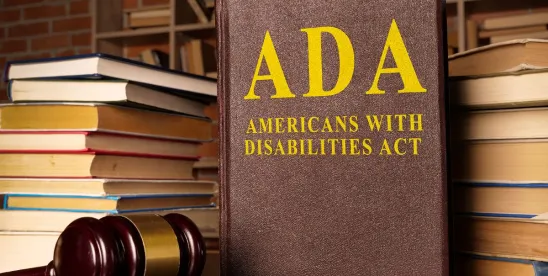Most employers are aware that, under the Americans with Disabilities Act (ADA), disability-related inquiries and medical examinations of employees may only be required when such inquiries and examinations are “job-related and consistent with business necessity.” However, employers may be less familiar with the fact that the ADA’s limitations on medical inquiries and examinations apply to both employees with a disability and employees without a disability. Indeed, a recent appeals court decision highlights the fact that employers may be liable for monetary damages and other relief for violating the ADA’s medical inquiry and examination limitations, even if the employee subjected to the medical inquiry or examination does not have a disability or perceived disability.
In Nawara v. Cook County, John Nawara, a correctional officer for the Cook County Sheriff’s Office, was involved in multiple heated interactions with his supervisor, Human Resources, and an occupational nurse. Based on these incidents, the Sheriff’s Office placed Nawara on paid leave and required him to provide signed medical authorization forms and undergo a fitness-for-duty examination before returning to work. Nawara refused to submit the requested medical authorization forms and, as a result, was eventually transitioned to unpaid leave.
While on leave, Nawara filed suit alleging that the Sheriff’s Office had violated the ADA’s restrictions on medical inquiries and examinations for employees. After a trial, the jury concluded that the Sheriff’s Office’s requests for Nawara’s medical records and fitness-for-duty examination requirement violated the ADA, but it chose not to award any damages to Nawara. Nawara then asked the trial court to order the Sheriff’s Office to pay him back pay and restore his seniority. The trial court granted Nawara’s request to restore his seniority but denied his request for back pay, concluding that Nawara was required to have a disability or perceived disability in order to obtain back pay for a violation of the ADA’s medical inquiry and examination provisions. Both parties appealed the trial court’s decision.
On appeal, the U.S. Court of Appeals for the Seventh Circuit (which covers Illinois, Indiana, and Wisconsin) noted that, during trial, Nawara had never claimed that he was disabled or that the Sheriff’s Office perceived him to be disabled. Nevertheless, the Seventh Circuit concluded that an employer’s violation of the ADA’s medical inquiry and examination provisions is discrimination on the basis of disability regardless of whether the employee has a disability or perceived disability. Consequently, the Seventh Circuit found that the ADA’s remedies applied to Nawara, and Nawara was authorized to recover back pay and have his seniority restored.
The Nawara case serves as a reminder that situations involving mandatory medical inquiries or examinations for employees are complex and are often difficult for employers to navigate. Employers with questions regarding the permissibility of medical inquiries or examinations should consult with experienced employment counsel before requiring an employee to provide medical information or submit to a medical examination to ensure that such actions do not violate the ADA.




 />i
/>i
